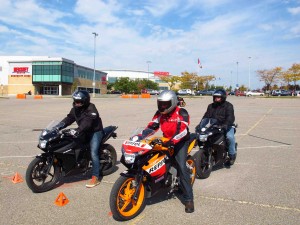7 Essentials for a Motorcycle Training Course
by Liz Jansen
Knowing how to ride safely is a matter of survival. It follows then, that you develop the skills you need at a recognized motorcycle training course. Anyone can get on a motorcycle and ride in a straight line. Handling a motorcycle competently under a myriad of situations requires basic skills like controlled braking, cornering and slow-speed maneuvers.
The best way to acquire those skills is under the tutelage of a qualified instructor at an accredited course. With all the choices out there, it’s tough to know which one to choose. Start with these essentials.
 7 Essentials for a Motorcycle Training Course
7 Essentials for a Motorcycle Training Course
- Professionalism. Look for high standards in the organization, beginning with your first contact. Ask how instructors are trained, how often they are trained and what certifications they have. Go out to a location where the course is conducted and watch how instructors interact with students.
- Other courses. Your first course is not your last. It’s nice to develop a relationship with a training provider, so when you’re ready for advanced training or specialized skills, you’re already confident in their ability to deliver.
- References. Get more than one reference, so someone who’s elated or someone else who’s disgruntled doesn’t overly influence your opinion. Bear in mind you never know what the student experienced or why, but get feedback that’s as balanced and objective as possible.
- Reputation. You want your course and the instructors to have the BEST reputation of all the programs.
- Bikes. For a course that provides motorcycles ask what make, model, size, and age. Training motorcycles go through an arduous moto life so you want to make sure they’re well maintained. When you’re out at the lot checking out the instructors (#1), check out the fleet of motorcycles and their state of repair.
- Facilities. Determine where the course is held, how much space is available, and what the training surface is like. Make sure it’s as free from distractions as possible, has facilities for protection from the elements (rain/heat/cold) and either has amenities on site or within a convenient range.
- Price. Although an important consideration, look at the total package, based on the essentials listed above. The lowest price is not always the best value for you.
As with any relationship, after establishing that the essentials are in place, the most important thing is to make sure the course is the right fit for you. Check with your intuition before deciding. It always steers you to the right decision.
Related Post: 7 Reasons for Every Rider to Take a Motorcycle Skills Course Every Year
